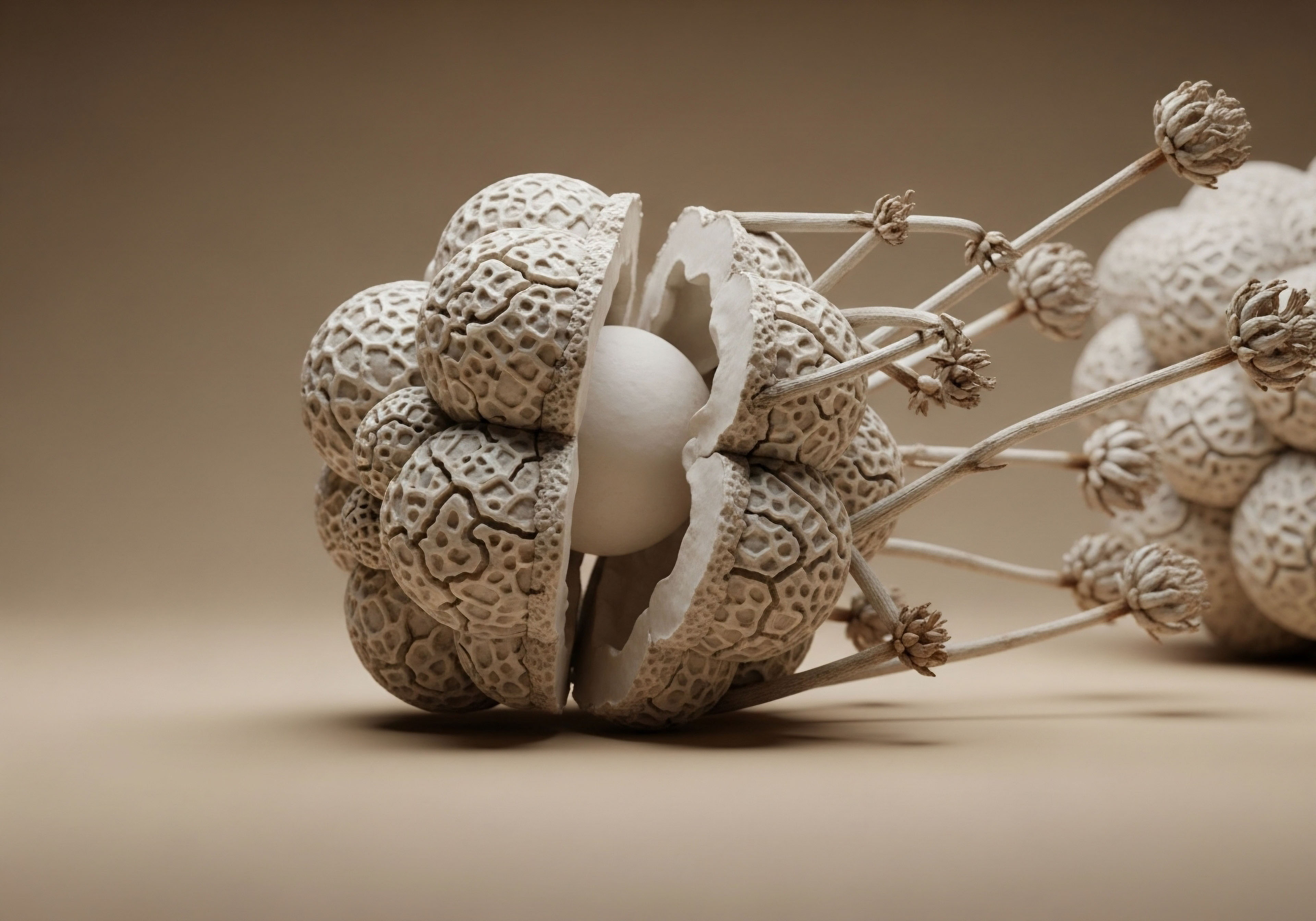

The Cognitive Price of Inaction
There is a silent tax on stillness. Every system in the human body, from the architecture of your bones to the lightning-fast network of your neurons, operates on a simple biological mandate ∞ adapt or degrade. Your brain is the command center of this entire operation.
Its ability to process, reason, and remember is a direct reflection of the demands placed upon it. A life defined by physical stasis sends a clear, constant signal to this command center to downshift, to conserve, and ultimately, to shrink its capacity. This cognitive decline is a preventable slide, a slow surrender mistaken for the inevitable arc of aging.
The choice to engage in resistance training is a declaration against this quiet decay. It is the most direct method of instructing your body to reinforce its most critical asset. Building muscle sends powerful biochemical directives to your brain, demanding it to grow stronger, faster, and more resilient.
The act of lifting a weight becomes an investment in your mental real estate, protecting the very structures responsible for memory and clarity from degeneration. Studies confirm that individuals who integrate strength training into their lives exhibit superior cognitive function, retaining their mental sharpness for years longer than their sedentary counterparts.
The alternative is to accept a gradual dimming of your own intellectual fire, a loss of the executive function that defines your ability to lead, create, and perform at your peak.
Your brain responds to physical stress by fortifying its structures for memory and learning, making resistance training a direct investment in your cognitive future.
We now understand that muscle tissue is an endocrine organ, releasing signaling molecules called myokines during strenuous activity. These molecules are the biological messengers that link the effort in your limbs to the performance of your mind. They cross the blood-brain barrier and initiate a cascade of growth and protection, directly influencing brain health and function.
To neglect your muscles is to starve your brain of these essential compounds. The result is a system less capable of managing glucose, more susceptible to inflammation, and demonstrably slower in processing speed. The cost of inaction is measured in lost focus, diminished drive, and the slow erosion of the cognitive power that makes you who you are.


Architecting a Resilient Mind
Building a better brain through resistance training is a process of systematic biological upgrades. Think of your muscular system as a peripheral pharmacy that manufactures and dispenses potent neurological enhancements. Each repetition of a lift is a prescription being filled, flooding your system with the precise compounds needed to sharpen cognitive function.
The process works by stressing the muscle, which in turn releases a cocktail of myokines that act as powerful agents for brain health. This is a direct, physical recalibration of your body’s internal chemistry, optimized for mental performance.

The Core Mechanisms of Cognitive Enhancement
The connection between muscle and mind is not abstract; it is a series of well-defined physiological events. Engaging in consistent resistance training initiates a powerful feedback loop that reinforces brain structure and function. This is a physical process, as tangible as the growth of the muscle itself. The brain, like a muscle, adapts to the stress by becoming stronger and more efficient.
- Structural Reinforcement ∞ Resistance training has been shown to protect the hippocampus, a region of the brain critical for learning and memory, from age-related shrinkage. This physical preservation of brain tissue is a direct result of the signaling prompted by muscular exertion.
- Neurotransmitter Production ∞ The act of lifting weights boosts the production of feel-good hormones like dopamine and releases endorphins. This chemical shift improves mood and motivation, creating a positive feedback loop that encourages consistent training.
- Increased Blood Flow ∞ While aerobic exercise is known for promoting the growth of new brain cells, resistance training is crucial for restoring and improving blood flow to the brain. This enhanced circulation delivers the necessary oxygen and nutrients to support the health and function of new and existing neurons.
- Myokine Release ∞ Different types of resistance training stimulate the release of specific myokines. High-load, low-repetition work and low-load, high-repetition work each trigger a unique mix of these brain-enhancing molecules, such as Brain-Derived Neurotrophic Factor (BDNF). A varied routine ensures the broadest spectrum of cognitive benefits.
Lifting weights triggers the release of myokines, which act as a ‘software update’ for your brain, strengthening neural connections and protecting against decline.
The protocol is straightforward. Consistency is the critical variable. Research indicates that training at least twice per week yields significant improvements in executive function. The intensity of the training matters; studies on older adults with mild cognitive impairment showed that high-intensity resistance training led to notable gains in cognitive function.
This is a dose-dependent response. The more strength gained, the greater the improvement in the brain’s executive functions ∞ the high-level processes that govern attention, planning, and self-control.


The Upgrade Becomes Tangible
The first signals of cognitive enhancement from resistance training are subtle. They appear not as a sudden flash of brilliance, but as a quiet sharpening of your daily experience. You will notice it in the ease with which you recall a name that was previously on the tip of your tongue.
It will manifest as an increased capacity to focus during a demanding project, sustaining concentration for longer periods without interruption. These initial improvements in processing speed and memory are the first tangible returns on your physical investment, often becoming apparent within the first few months of consistent training.
As you progress, typically around the six-month mark, the benefits become more pronounced and measurable. This is the point where studies have documented significant improvements in overall brain function, especially for individuals starting from a baseline of cognitive impairment.
The self-control required to adhere to a regular training schedule translates into improved response inhibition in other areas of your life. You will find yourself better equipped to resist impulsive decisions and maintain focus on long-term goals. The mind-body connection strengthens, and the feeling of physical power is mirrored by a sense of mental command.
The long-term horizon, a year and beyond, is where resistance training reveals its profound protective qualities. The cognitive gains achieved are not fleeting. Research has shown that the improvements in cognition are retained even a full year after the training period has concluded.
More importantly, this is the timeframe where the structural changes in the brain become a powerful defense against neurodegenerative diseases. By consistently engaging in strength training, you are actively building a more resilient brain, one fortified against the cognitive decline that was once considered an unavoidable part of aging. The “when” is now, and the results are both immediate and enduring.

Your Biology Is Listening
You possess the tools to directly influence the trajectory of your cognitive health. The conversation between your muscles and your mind is constant, and with every repetition, you are guiding that dialogue. The decision to lift, to push, to create physical stress is an act of authorship over your own biological story.
This is the ultimate form of personal optimization, a direct intervention in the systems that govern your mental acuity and vitality. The question is no longer whether you can build a better brain, but whether you will choose to.

Glossary

resistance training

cognitive function

strength training

executive function

brain health

myokines

mental performance

hippocampus

dopamine




